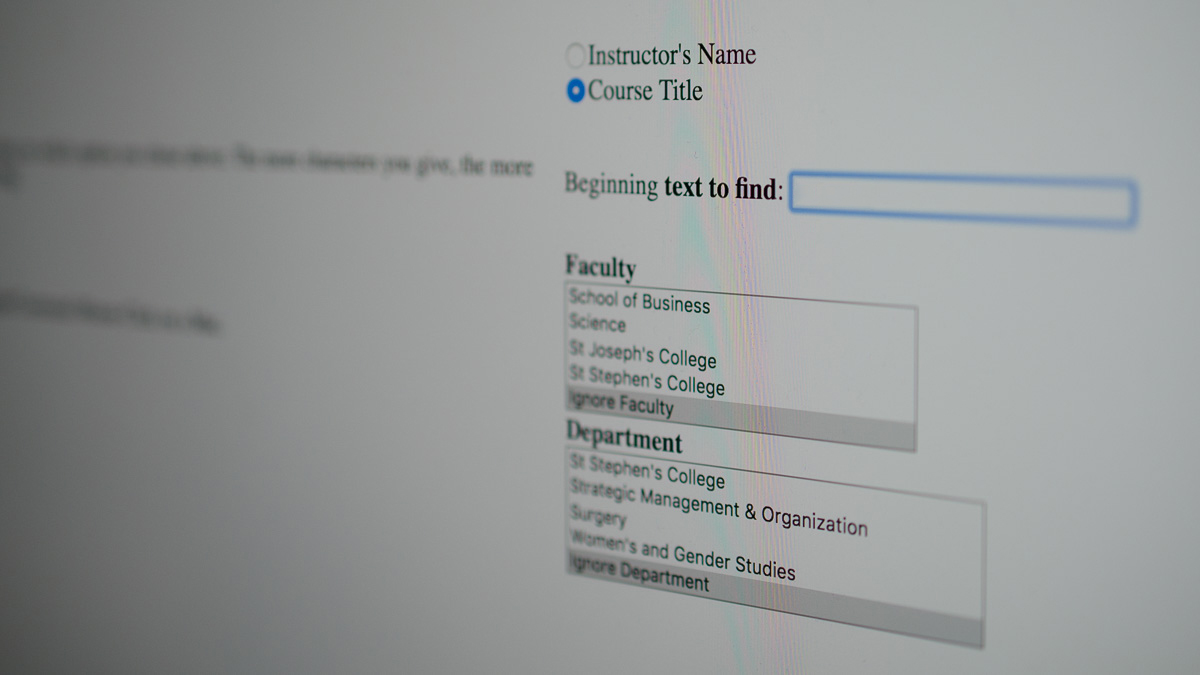University discusses potential gender bias in USRIs
 Rosty Soroka
Rosty SorokaSexism became the main point of contention during the latest discussion around Universal Student Ratings of Instruction (USRI) and their usefulness as a teaching evaluation tool.
The University of Alberta is in the process of reviewing various methods of teaching evaluation. This includes USRIs, the feedback students give on their classes and their instructors at the end of every semester, and how that information is used to decide which professors receive promotions. General Faculties Council (GFC), the highest body for academic governance at the university, tasked the Committee on the Learning Environment, one of its subcommittees, to draft a report on existing research on USRIs as well as a list of recommendations in order to guide further discussion on the issue.
At their meeting on September 25, GFC was set to accept the report and the recommendations made by the learning environment committee, but concerns about sexism in student ratings became a major issue. Because debate lasted longer than expected, and GFC had other items to approve by that day, the motion to accept the report was moved to the next meeting on October 30.
Concerns about Sexism in Student Feedback
Carolyn Sale, an English professor who sits on GFC, said there is significant international research that shows that student feedback is skewed against female instructors.
During the meeting and in her own blog, she cited an article from The Economist reporting on such a study. The article states that students are biased against female instructors despite the fact that students often achieved the same course grade when the class is taught by a male instructor, and that sexism in student evaluations is a contributor to the scarcity of female professors in academia.
Sarah Forgie, who chairs the learning environment committee and worked on the USRI report, said research into teaching evaluations needs to be ongoing, and that the motion at GFC is a signal to continue that work.
“What we really want to do is make the student’s learning experience better, and the teacher’s teaching experience better by improving teaching evaluation,” Forgie said. “What we want to do is keep looking at it.”
However, Sale said the possible sexism in USRIs means that the information should not be used by administrators when evaluating an instructor for promotion, and that GFC should not endorse that practice.
“To do so would be to affirm that it is acceptable for us to continue to use in merit, tenure, and promotion decisions teaching evaluation mechanisms that are increasingly being characterized as discriminatory,” Sale said.
Sale said she is against the use of USRIs in decisions of promotion and tenure, and that the evaluations should only be used as a way for instructors to improve their teaching. She added that the report from the learning environment committee should not dismiss the research that links student feedback and sexism.
“We cannot simply set aside possible concerns with gender bias in our USRIs,” she said.
Recognizing the Need for Student Input
Even though Sale said the report by the learning environment committee doesn’t go far enough in discussing sexism in student evaluations, Students’ Union vice-president (academic) Shane Scott said the report recognizes the research is there, just that it’s not entirely conclusive. Scott, who sits on the learning environment committee, also said USRIs are valuable as they’re a way for students to give direct feedback about courses and instructors.
“At the end of the day it’s paramount that students have a say in feedback and evaluations,” Scott said. “They still have to be given some weight because students make up the largest constituency on campus and are the ones who sit in a classroom every day so it’s important they have a say.”
Scott said the debate around USRIs, their potential for discrimination, and the way they’re used by faculty evaluation committees, resurfaces year after year. He said Sale’s concerns have merit, but the research on the issue is inconclusive, and that the report on USRIs does recommend further research into bias in student feedback.
“It’s not something that (the learning environment committee) is looking to write off,” Scott said. “We can’t adamantly say, ‘Yes bias matters.’ We don’t know and research on both sides of it is still up in the air, and that’s one thing that the committee acknowledges.”
Forgie agreed with Scott, saying that evaluation tools such as USRIs have a place in improving students’ experiences and that the learning environment committee is asking for GFC’s approval to keep looking at it.
“Even the perfect tool has the potential for bias, for misuse, for misinterpretation, but also the potential for excellent feedback,” Forgie said. “So we need to take that into account no matter what we use.”
Sale said that student feedback on courses and instructors is valuable, but that her concerns are with their use in employment decisions given the evidence that USRIs discriminate by gender.
“It’s not that instructors at this university don’t want feedback from students, we want it, we just don’t want it used in a particular way given the pretty strong indications that there is a discriminatory aspect,” Sale said.
The next General Faculties Council meeting is on October 30 from 2 p.m. to 4 p.m. in the Council Chambers (University Hall 2-100), and is open to the public.




